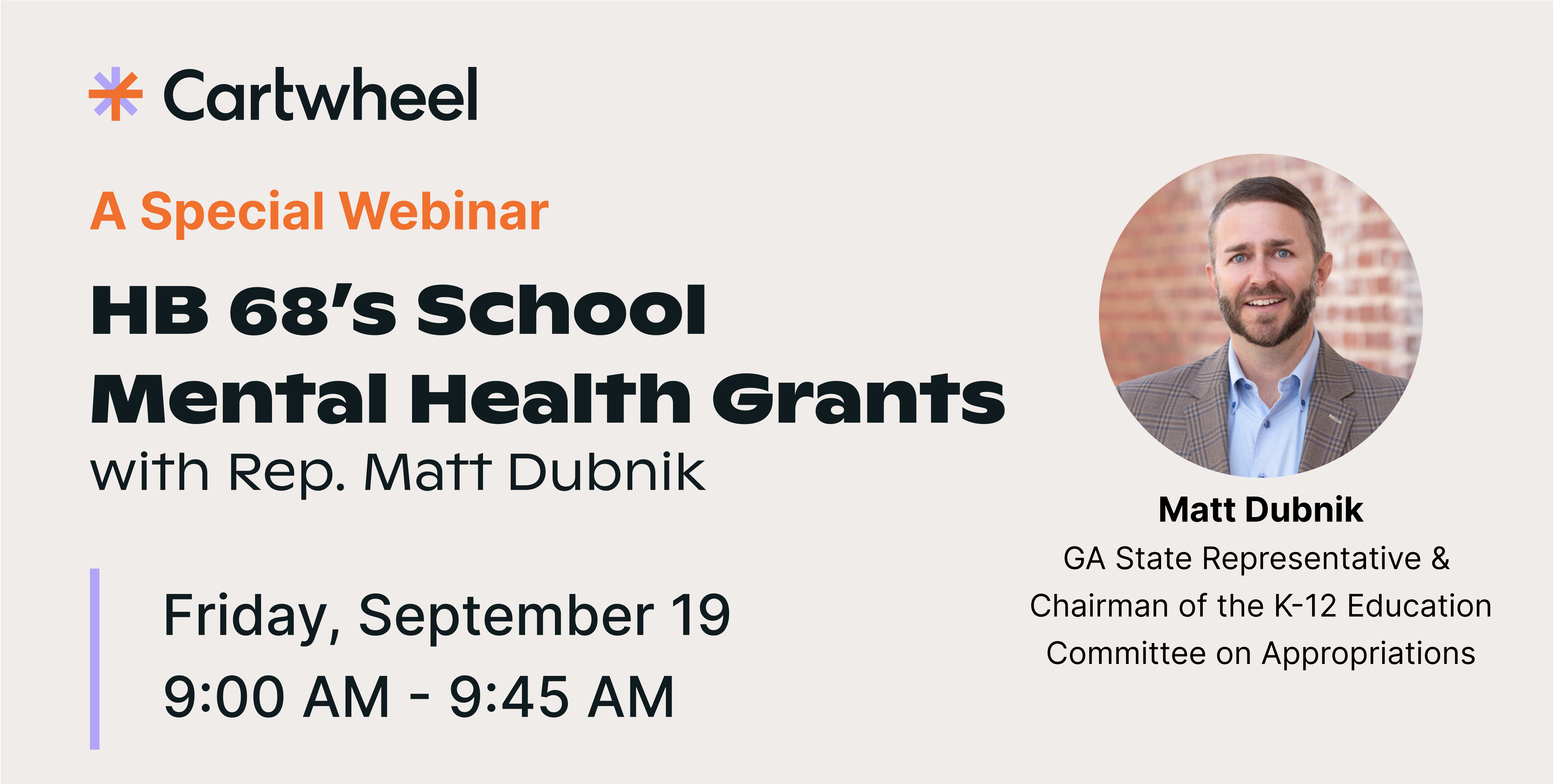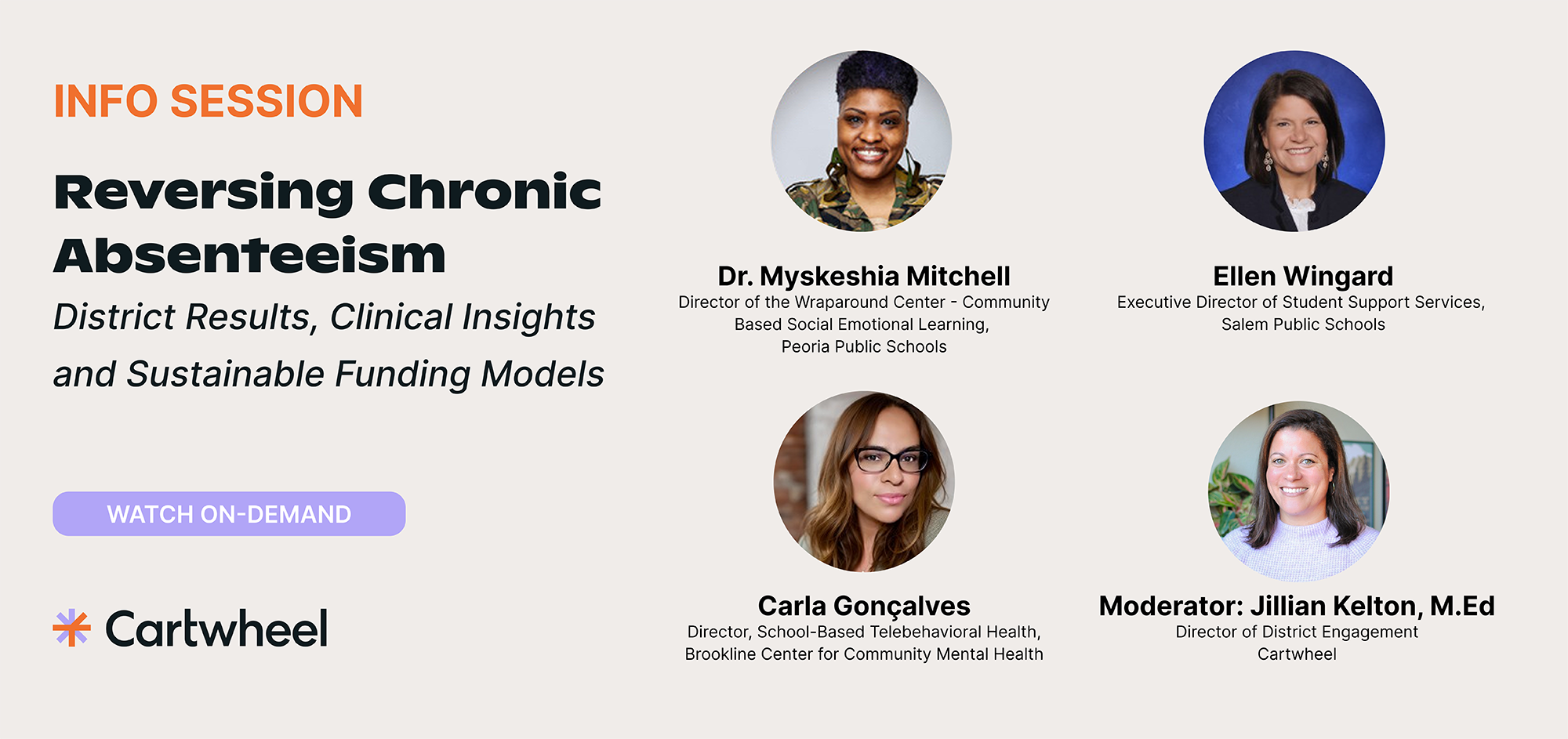Cartwheel hosted a webinar with Representative Matt Dubnik, Chairman of the K-12 Education Appropriations Committee, to discuss the new mental health grants that are part of Georgia’s current state budget (HB 68)—a new state initiative that provides $20,000 in dedicated mental health funding for every public middle and high school.
Cartwheel’s COO, Dan Tartakovsky, moderated the conversation, which drew school district leaders, counselors, and RESA representatives from across Georgia. Here are the key takeaways:
Why This Funding Matters
Representative Dubnik explained that the legislature’s intent was simple: treat mental health like physical health and provide dedicated resources to schools, just as the state does for buses, school safety, and nutrition.
- Counselors are overextended. For a school counselor to handle college guidance, family issues, and student well-being, that workload often amounts to much more than a full-time job. And many counselors are not licensed clinicians, which means mental health needs can often go beyond their role scope.
- Students and families are asking for help. Legislators heard directly from schools and constituents about rising mental health needs, long waitlists, and access barriers—especially in rural areas.
“This is about students and their well-being,” said Rep. Dubnik. “We’ve all heard the stories about waitlists, about kids who need help now but can’t get it. It’s time for the state to step up and do our part.”
How the Grant Works
The state provides $20,000 per middle and high school in a district. For example, a district with 3 middle schools and 2 high schools will receive $100,000 in total funding.
- Flexibility is built in. Districts can use funds for in-person or telehealth services as long as the funds are spent on direct services for students and do not supplant existing funding.
Rep. Dubnik emphasized: “We don’t want to be prescriptive. Every community is different, and local leaders know their kids better than we do at the Capitol. These dollars should work for you, not the other way around.”
- Funds are already available. District leaders should connect with their central office to confirm distribution and planning, and if central office leaders are not receiving funding yet, they should follow up with GaDOE.
Measuring Success
Rep. Dubnik noted that uptake and outcomes will determine whether the legislature continues—and expands—funding. He said, “We’ll be looking closely at: Did the dollars get used? Did they make a difference? Are we hearing success stories? Because if the answer is yes, then we’ve got a great case to keep this going.” They will assess:
- Awareness and utilization: Are districts using the funding? How?
- Success stories: Are there visible successes in student support?
- Data and outcomes: Can schools show improved access, engagement, satisfaction, and outcomes from the services?
Rep. Dubnik encouraged school leaders to be proactive in sharing updates by sharing, “Legislators need to hear directly from you. If you run into roadblocks, tell us. If you see wins, tell us that too. The more data and stories we have, the stronger our hand is to expand this program.”
Rep. Dubnik wants to hear your stories of how this funding is benefitting your districts. You can email him at matt.dubnik@house.ga.gov, if you have any questions or want to share a story.
If you have any questions for GaDOE about this initiative, please contact Dr. Tabathia Baldy, Senior Program Manager at the Office of Whole Child Supports (OWCS), at tabathia.baldy@doe.k12.ga.us.
Looking Ahead
- Elementary schools: Current funding applies only to middle and high schools, but expansion to lower grades will be considered if the data demonstrates a need.
- Sustainability: Funding is currently allocated one-time but there is ongoing discussion around making it recurring. In the meantime, districts can partner with outside agencies and telehealth providers that leverage insurance reimbursement to access more services per dollar of state funding.
- Beyond the numbers: In addition to attendance, behavior, and academic outcomes, schools should track more qualitative factors such as school climate, morale, and students’ comfort knowing support is available.
As Rep. Dubnik put it: “At the end of the day, this isn’t just about test scores or absentee reports. It’s about a kid knowing there’s someone they can talk to tomorrow when things get tough. That’s success.”
How Cartwheel Can Help
As one of the Georgia Department of Education’s approved mental health partners, Cartwheel works alongside districts to:
- Provide no-waitlist therapy, psychiatry, and family support via Georgia-licensed clinicians.
- Bill insurance (including Medicaid) to extend the reach of grant dollars and not spend money on services that are already eligible for third party reimbursement.
- Support FERPA and HIPAA-compliant data collection to measure the impact of services.
- Use telehealth to address more specialized needs such as school avoidance, chronic absenteeism, services in multiple languages, and access to child psychiatrists and psychiatric nurse practitioners.
Visit cartwheel.org/georgia to learn more about Cartwheel and find more guidance on maximizing the value of these school mental health grants for your district.



.png)
.png)
